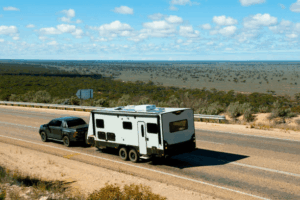The digital nomad lifestyle is booming, and many professionals are trading cubicles for the open road. If you’ve ever dreamed of working while exploring national parks or parking your RV by the beach, one thing is non-negotiable: reliable internet. That’s where RV internet for remote work comes in.
In this guide, we’ll break down the best ways to stay connected on the move, from RV Zoom internet setups to unlimited hotspots designed for working professionals.
Why Internet Is Essential for RV Remote Work
For remote workers, internet access isn’t just about streaming movies at night—it’s the backbone of your income. Digital nomads rely on a stable connection for:
-
Video calls on Zoom, Teams, or Google Meet
-
Cloud apps like Google Drive, Slack, and Dropbox
-
Email and client communication
-
Content uploads for YouTube, podcasts, or blogs
-
Online teaching and freelancing platforms
Without reliable connectivity, deadlines slip and productivity drops. That’s why investing in the right work from RV WiFi setup is crucial.
Internet Options for Remote Work in an RV
1. Cellular Internet (4G & 5G)
Cellular networks are the most common choice for RVers. With hotspots or routers, you can connect laptops and phones to 4G or 5G towers.
Pros:
-
Fast speeds in urban and suburban areas
-
Affordable equipment and simple setup
-
Great for RV Zoom internet calls
Cons:
-
Coverage gaps in rural or mountainous regions
-
Data caps on some plans
Explore wireless internet for RV if you’re considering this option.
2. Satellite RV Internet
Satellite services like Starlink are popular with RVers who venture into remote areas. A dish on your RV connects to satellites orbiting the Earth.
Pros:
-
Works where cellular fails
-
Expanding nationwide coverage (FCC overview of satellite)
Cons:
-
High equipment cost
-
Latency can affect real-time video calls
3. Public WiFi at Campgrounds and Cafes
Campgrounds often advertise free WiFi, but signals are usually weak and overloaded. Coffee shops or libraries can fill in gaps, though they’re not ideal for consistent remote work.
Pros: Free access in some locations
Cons: Unstable, unsecured, and unreliable
4. RV Unlimited Hotspots
Many digital nomads choose RV unlimited hotspot plans. These portable devices let you connect multiple devices without worrying about overages.
Pros:
-
Flexible and mobile
-
Perfect for teams or families in one RV
-
Unlimited data options available
Cons:
-
Depend on carrier coverage
-
May throttle speeds after high usage
How Much Speed Do You Need for Remote Work?
Speed needs vary by task:
-
Zoom or Teams calls: 3–4 Mbps upload and download
-
Email and browsing: 1–5 Mbps
-
File uploads/downloads: 10–25 Mbps
-
Streaming or content creation: 25 Mbps or more
To avoid stress, aim for at least 25–50 Mbps if you rely on heavy video calls or creative uploads.
Tips for Stable RV Zoom Internet
Even with good service, connection hiccups happen. Here are ways to smooth out your workdays:
-
Use a signal booster to strengthen weak cellular signals.
-
Prioritize your work device using router QoS settings.
-
Switch to Ethernet if your hotspot or router allows it.
-
Test before meetings—run a quick speed check before Zoom calls.
-
Combine connections with load-balancing routers for redundancy.
Balancing Work and Play with RV Internet
One of the biggest perks of digital nomad life is flexibility. But when work depends on the internet, you can’t take risks. By combining options—like cellular hotspots with satellite backup—you ensure you’re always online when clients need you.
At the same time, reliable internet lets you enjoy downtime: binge-watch Netflix, stream YouTube, or game online after a long day.
Cost Considerations for RV Remote Work
-
Cellular hotspots: $50–$100/month, devices around $200
-
Satellite setups: $100–$150/month, equipment $500–$700
-
Signal boosters: $200–$500 one-time cost
-
Unlimited hotspot plans: Often $80–$120/month
Your budget should reflect how often you work from remote locations. If you’re mostly near cities, cellular is cost-effective. If you go off-grid often, satellite may be worth it.
Ring Planet Communications: RV Internet Solutions
At Ring Planet Communications, we specialize in helping digital nomads and RV travelers stay connected. Whether you need work from RV WiFi for daily calls, RV Zoom internet for client meetings, or RV unlimited hotspot plans for flexible living, our solutions are designed with mobility in mind.
We know that staying productive while traveling means reliable coverage, flexible pricing, and simple setup. That’s why our team is here to match you with the right plan for your lifestyle.
FAQs About RV Internet for Remote Work
1. Can I work full-time from my RV with just a hotspot?
Yes, as long as you’re in strong coverage areas. Many remote workers rely on hotspots daily.
2. Is satellite internet reliable for Zoom calls?
It works, but latency may cause delays. Cellular is better for real-time video calls.
3. Do I need unlimited data for RV remote work?
Yes, if you work long hours or use video calls often. Unlimited plans prevent surprise overages.
4. What’s the best internet option for national parks?
Satellite is often the only reliable option in remote parks. Cellular may struggle without nearby towers.
5. How do I secure my RV WiFi?
Use strong passwords, enable WPA2 or WPA3 encryption, and consider a VPN for added safety.
Final Thoughts
For digital nomads and remote workers, RV internet for remote work is a lifeline. Cellular hotspots offer speed and affordability, while satellite RV WiFi ensures coverage off-grid. For most, the perfect solution is a mix of both, backed by signal boosters and unlimited data.
The road may be unpredictable, but your internet doesn’t have to be. With Ring Planet Communications, you can work, create, and explore with confidence—without losing your connection.





